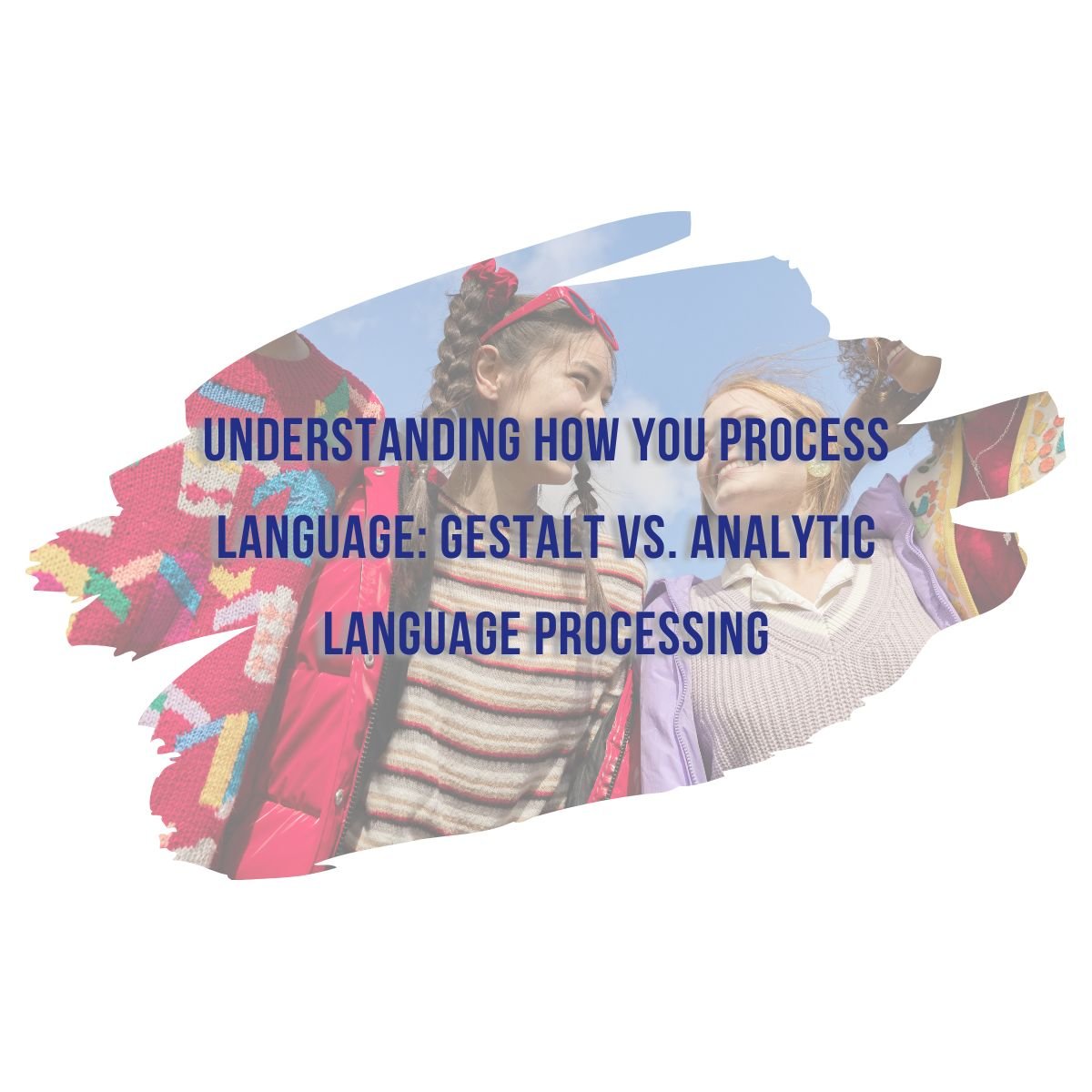Understanding How You Process Language: Gestalt vs. Analytic Language Processing
Read Time: 12 minutes
Have you ever found yourself struggling to get your point across? Or missed the punch line when the rest of your friends were laughing? Does it feel like a struggle to verbally connect with others, or “keep up” with conversation”? If so, know that you’re not alone and that your feelings may result from how you process language.
We all have unique ways of thinking, speaking, and understanding language. When it comes to how we take in and make sense of language and experiences, there are two models of processing, Gestalt Language Processing and Analytic Language Processing. Both models are valid ways of understanding and expressing ourselves, but they’re quite different—and these differences can impact how we experience relationships, handle emotions, and even engage in therapy.
In this blog, we’ll look at each processing style, why we tend to see more gestalt processors here at Interfaith Bridge Counseling, and how therapy can help you process.
What Is Analytic Language Processing?
Imagine language processing as building with Legos. As an analytic language processor, you have a clear set of Legos and know each piece and how it all fits together to create a complete project. In other words, you understand a sentence and can break it down into individual words and parts. You might even be someone who thinks about grammar, structure, and precise language.
Someone who processes language analytically might express themselves with a sentence like, “I feel sad and anxious because I have a lot on my mind.” They may be able to articulate their feeling of sadness and anxiety and have an easier time exploring exactly what’s on their mind that’s causing those feelings.
Why might it be easier for analytic processors to express and understand their feelings? In this form of processing, folx can quickly break down complex ideas into smaller, understandable pieces. And because you can communicate more specifically, step-by-step, it may feel more comfortable expressing yourself in conversations or social situations.
Psst...by the way…
LOOKING FOR COLORADO TEEN THERAPISTS WHO SPECIALIZE IN THERAPY FOR NEURODIVERGENT TEENS & YOUNG ADULTS?
What Is Gestalt Language Processing?
If you’re a gestalt processor, you approach language in a big-picture way. Take the Lego analogy: rather than building and understanding a Lego project as each individual piece, you see a Lego project as a finished project. You might snap together pre-built pieces to create a whole, but you don’t really focus on the details of building. If something doesn’t fit or come together nicely, it may be difficult for you to break the project down into individual pieces to figure out what went wrong. In terms of language, you tend to understand sentences as phrases, not necessarily as individual words first. Because of this, it may be harder to articulate yourself and your feelings.
Think of the sentence “I feel sad and anxious because I have a lot on my mind.” As someone who is a gestalt processor, you might express this feeling as something like “I feel like I’m drowning” or “It’s all too much.” You tend to express yourself with phrases that you’ve heard before or that encompass your feelings as a whole, rather than find specific words for each specific emotion.
This way of thinking and communicating is just as valid as analytic processing but comes with its own unique challenges. You might find it tricky to express what’s on your mind in clear, step-by-step language, which can be frustrating and overwhelming for yourself and others. You know what you’re feeling in a general sense, but putting those feeling into words that others can understand can feel damn near impossible.
Why Therapy Is Especially Helpful for Gestalt Processors
So where does therapy come in? And why does it matter?
Since gestalt processing involves understanding language and experiences in chunks, teens and young people with this style often find themselves needing a bit more time and space to process. Therapy, especially long-term therapy, can offer just that—a safer, consistent environment to return to each week where you can take your time unpacking and exploring different thoughts and feelings.
Many teens and young adults who come to us at Interfaith Bridge Counseling, especially folx who are neurodivergent, are gestalt processors. We understand this style of processing and how difficult it may be to express yourself in a way that others may understand. In therapy, you’re given the space to gradually explore your big-picture experiences, where we as therapists can act as guides to help you break things down at a comfortable pace.
Think of it this way: therapy can help you connect the dots between different “chunks” of experiences, which can lead to breakthroughs in understanding your own thoughts, feelings, and patterns. With support, you can learn more about your natural way of thinking, and become more comfortable expressing yourself in a way that feels authentic.
[A quick note: While we often work with gestalt language processors at Interfaith Bridge Counseling, we warmly welcome everyone, no matter how you process language. Therapy can be just as valuable for analytic processors, helping you tune into your intuitions and connect with your deeper emotions.]
Therapy for Gestalt Processors in Denver, CO
Knowing more about your language processing style can make a huge difference in how you approach therapy. At Interfaith Bridge Counseling, we aren’t here to label you as one processor or another, we’re here to recognize and honor the way you think and communicate. We’re here to help you understand what you’re feeling and help you to express those feelings in a way that feels authentic to you. If you’re a Colorado resident and you’d like to learn more about us and how we can help you, please reach out! We’d be honored to help you in your journey toward self-understanding and emotional well-being.
About Our Author | Lena McCain MA, LPC. 0017723
Lena McCain is our Founder here at Interfaith Bridge Counseling, where she continues her support as our Clinical Director. She also holds a Master of Arts degree in Clinical Mental Health: Mindfulness-Based Transpersonal Counseling Psychology from Naropa University.
Lena’s drive and passions lie in the realm of community building and youth collaboration, which she has spent the last 12 years studying with an emphasis on one’s exploration of personal growth, community healing, and multicultural values. Lena’s expertise in these areas and the therapeutic field acts as a reminder to our community, teens, and young adults that they are not alone in their experience of life.



![[Image] Scribble picture of Caucasian woman with hands on her head in front of a graffiti painted wall.](https://images.squarespace-cdn.com/content/v1/63d95f727c30a3483f4424e4/6b1ef401-b6f4-4af2-92f6-daeaf3cca61b/Lena-McCain-Group-Therapist-Teen-Chat-Social-Skills-CO.jpg)